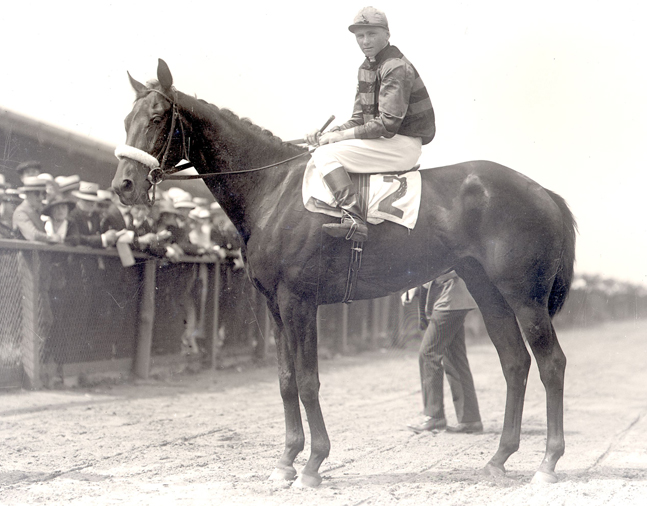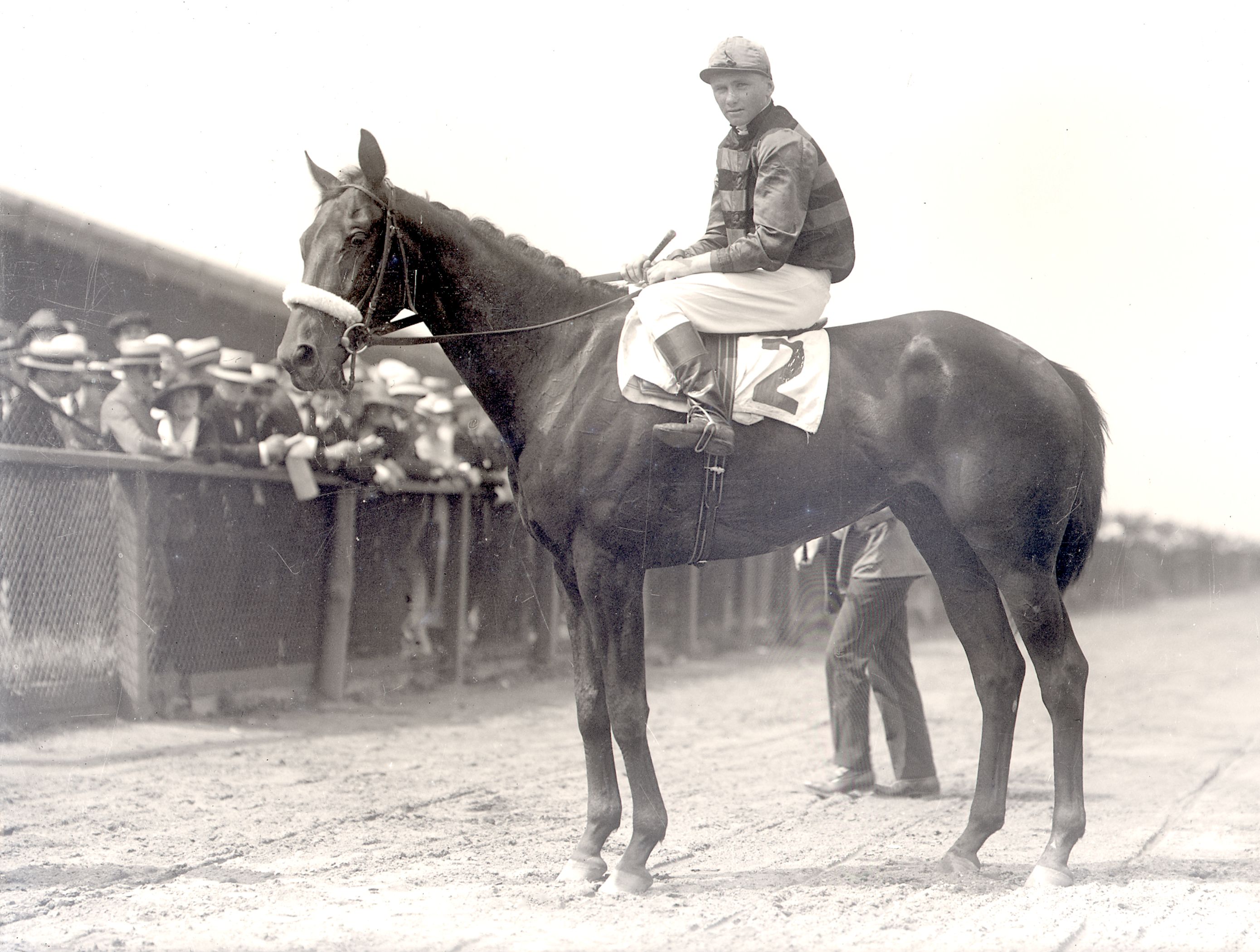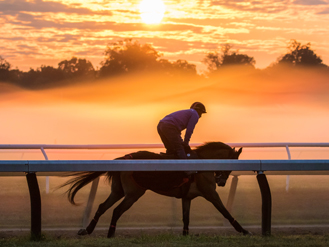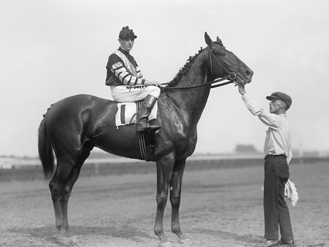Billy Kelly (KY)
Billy Kelly was an overshadowed stablemate of America’s first Triple Crown winner, Sir Barton, and as a result did not receive the notoriety his accomplishments likely would have commanded under different circumstances. While Sir Barton earned lasting celebrity and a rightful place in the Hall of Fame in 1957, Billy Kelly’s legacy faded into obscurity through the procession of time.

2015
1916
Dick Welles
Glena
Free Knight
Woodlawn Farm
W. F. Polson
Comdr. J. K. L. Ross
William Perkins
H. Guy Bedwell
1918-1923
$99,782
Racing Record
69
Starts
| 1918 | 17 | 14 | 2 | 0 | $33783 $33,783 |
| 1919 | 19 | 9 | 7 | 2 | $26563 $26,563 |
| 1920 | 12 | 6 | 3 | 2 | $16048 $16,048 |
| 1921 | 17 | 9 | 0 | 2 | $20488 $20,488 |
| 1922 | 1 | 0 | 1 | 0 | $1000 $1,000 |
| 1923 | 3 | 1 | 1 | 1 | $1900 $1,900 |
Biography
Billy Kelly was an overshadowed stablemate of America’s first Triple Crown winner, Sir Barton, and as a result did not receive the notoriety his accomplishments likely would have commanded under different circumstances.
While Sir Barton earned lasting celebrity and a rightful place in the Hall of Fame in 1957, Billy Kelly’s legacy faded into obscurity through the procession of time.
Upon close inspection, however, it becomes evident that Billy Kelly’s achievements more than hold their own in comparison to his acclaimed stablemate and are most worthy of Hall of Fame recognition.
More than 90 years after Billy Kelly’s final race — and almost 60 years after Sir Barton was lauded with his Hall of Fame induction — Billy Kelly finally received his due alongside racing’s immortals as a Hall of Fame member in the Class of 2015.
With a career record of 39-14-7 from 69 starts and earnings of $99,782, Billy Kelly was a durable and dependable runner who excelled under high weight assignments at a variety of distances. He is generally regarded as the finest American sprinter of his era and had success carrying his speed to victory in races up to and including 1¼ miles.
As for his rivalry with Sir Barton, Billy Kelly more often than not proved superior. In the 12 races they competed in the same field, Billy Kelly either won outright or finished ahead of Sir Barton eight times. In six of those eight events, Billy Kelly either conceded weight (as much as 18 pounds) to Sir Barton or met him on equal terms.
Foaled in 1916 at Woodlawn Farm in Erlanger, Kentucky, Billy Kelly was purchased as a yearling for $1,500 by W. F. Polson and sent to trainer William Perkins. A bay gelding small in stature, Billy Kelly “looked like a lean mule,” according to a contemporary account when he arrived at the races as a 2-year-old.
Billy Kelly made his career debut at the old Kentucky Association track at Lexington in April 1918. He won that first start with ease and then added an allowance victory before stepping up to stakes competition. An eight-length win in the Idle Hour Stakes at Lexington and a four-length victory in the Bashford Manor Stakes at Churchill Downs — two of the premier events for juveniles on the Kentucky spring schedule at the time — suggested Billy Kelly was going to be a force to be reckoned with.
At Saratoga that summer, Billy Kelly competed five times in a 20-day span. He began by setting a track record of 1:05⅗ for 5½ furlongs in winning the Flash Stakes. Two days later, he won the United States Hotel Stakes by 1½ lengths. Four days after his second Spa win, Billy Kelly contested the Albany Handicap under 133 pounds and finished second by a length to Star Hampton (115 pounds).
The defeat in the Albany Handicap in no way tarnished Billy Kelly’s growing reputation. In fact, the valiant effort in what was his third race in seven days prompted Commander J. K. L. Ross, a prominent Canadian owner, to purchase Billy Kelly from Polson for $27,500.
Ross turned Billy Kelly over to trainer H. Guy Bedwell and continued the horse on his summer campaign at Saratoga. Seven days after his loss in the Albany Handicap, Billy Kelly splashed through the mud to win by eight lengths in the Sanford Memorial Stakes under 130 pounds. He then carried 135 pounds — conceding a range of 14 to 35 pounds — to his rivals in winning the Grab Bag Handicap to wrap up his Saratoga sojourn with four wins and a second in three weeks.
Billy Kelly then won three in a row in September at Havre de Grace in Maryland, including the Eastern Shore Handicap under 135 pounds. Next it was on to Laurel Park for wins in the Annapolis Stakes and the all-ages Columbia Handicap in October. Billy Kelly’s seven-race win streak was snapped when he finished second by a head to Eternal in the John R. McLean Memorial. He rebounded to defeat future champion Mad Hatter in an allowance race Nov. 5 at Pimlico in his final start of 1918. Billy Kelly concluded his remarkable 2-year-old season with a record of 14-2-0 from 17 starts and earnings of $33,783.
When the calendar turned to 1919, Billy Kelly continued his winning ways with victories against older horses in the Hartford and Philadelphia handicaps at Havre de Grace, conceding weight each time. Ross then entered both Billy Kelly and Sir Barton in the Kentucky Derby. It was expected that Sir Barton would set a fast pace and wear down the competition for Billy Kelly to come running late. However, Sir Barton pulled away and was never reeled in. He won by five lengths with Billy Kelly second. It was a monumental day for the Ross stable, marking the first time in Kentucky Derby history that horses carrying the same colors finished first and second.
While Sir Barton went on to win the Preakness Stakes and Belmont Stakes to become America’s first Triple Crown winner (the term was not popularized until Gallant Fox duplicated the achievement in 1930), Billy Kelly also continued to run well. Following the Derby, he won the Toboggan and Capital handicaps and also earned victories that year over Sir Barton and Sun Briar, the previous year’s Travers Stakes winner.
Billy Kelly began his 4-year-old season of 1920 with a pair of victories at Havre de Grace, including his second consecutive Hartford Handicap, in which he defeated 1914 Kentucky Derby winner Old Rosebud. Later in the year, Billy Kelly competed in three serial weight-for-age races in a 10-day span at Pimlico, winning twice and finishing second once. He won the first race under 139 pounds, finished second to Mad Hatter in the second event and defeated both Sir Barton and Mad Hatter in the third race of the series, which was Sir Barton’s final career start.
Still going strong as a 5-year-old, Billy Kelly began 1921 with six consecutive victories. He carried 130 pounds or more four times during the stretch, including 132 in winning the Hartford Handicap for the third year in a row, and 135 pounds during his victory in the Connaught Handicap at Blue Bonnets in Montreal. Billy Kelly added three more wins later in the year, among them a second victory in the Capital Handicap.
In his only race of 1922, Billy Kelly’s attempt at winning a fourth consecutive Hartford Handicap came up a length short, as the brilliant Exterminator prevailed. Billy Kelly did not race again for more than 17 months. He returned Sept. 22, 1923, at Blue Bonnets, and won his final career race in a minor handicap event. Billy Kelly finished second and then third in his final two career starts that October at Laurel before being retired.
Billy Kelly died in 1926 at the age of 10 at a farm owned by Ross at Verchères, a small hamlet about 20 miles from Montreal. He was buried on the farm’s property on the south bank of the St. Lawrence River.
Achievements
Champion 2-Year-Old Male — 1918
Notable
Won the Hartford Handicap — 1919, 1920, 1921
Won the Capitol Handicap — 1919, 1921
Won the Annapolis Handicap — 1918
Won the Bashford Manor Stakes — 1918
Won the Columbia Handicap — 1918
Won the Eastern Shore Handicap — 1918
Won the Flash Stakes — 1918
Won the Grab Bag Handicap — 1918
Won the Idle Hour Stakes — 1918
Won the Sanford Stakes — 1918
Won the United States Hotel Stakes — 1918
Won the Philadelphia Handicap — 1919
Won the Susquehanna Handicap — 1919
Won the Toboggan Handicap — 1919
Won the Aero Handicap — 1921
Won the Connaught Handicap — 1921
Won the King George Stakes — 1921
Media





